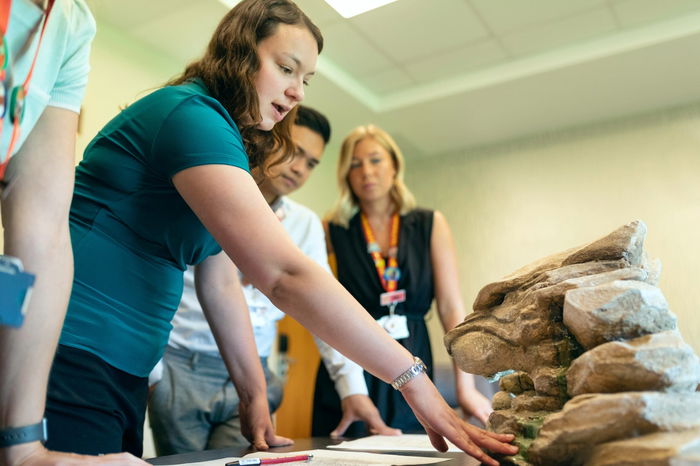

Personal Insights Reveal Need for New Financial Tools
October 2, 2024
At a Glance
Insights from JFF focus group conversations on the challenge of achieving personal financial success highlight the need for innovative fintech tools that can help unbanked families manage their finances.
The stress of juggling bills, facing unexpected expenses, or feeling trapped in a cycle of debt is all too familiar for the more than 200 million people in this country who live paycheck to paycheck. And such concerns may be compounded for the members of the nearly 25 million U.S. households that are underbanked or unbanked (meaning no one in the household has a checking or savings account at a bank or credit union).
For many of those individuals, achieving personal financial success may feel like an unattainable goal. Involving more than just having the money to cover basic needs, personal financial success encompasses freedom from overwhelming debt, the ability to support loved ones without making financial sacrifices, and actively building intergenerational wealth. These pursuits transcend statistics. Falling short of personal financial success can have a negative impact on one’s physical, mental, and emotional well-being while undermining household stability and reducing quality of life for individuals and their families.
At Jobs for the Future (JFF), we believe tech-based financial products and services can enable more people to achieve personal financial success by providing unbanked and underbanked families with tools they can use to manage their finances, make informed decisions about money, get loans, handle everyday transactions, and build wealth.
With support from the Ares Foundation, we carried out an in-depth review of the financial technology (fintech) marketplace to identify innovative solutions. As part of that effort, we wanted to understand what personal financial success means to real people, so we partnered with Gallup to host two focus groups of workers and learners who agreed to get together for in-person conversations. Meeting in the Washington, DC, metro area in May 2024, they shared their thoughts about a range of money-related topics.
Read on for a closer look at three key insights we gleaned from those conversations.
Key Insight 1: Many people think of their financial plans holistically, saying that personal financial success means not only having the money to pay for their material needs but also having the freedom to focus on personal goals.
Based on the conversations that took place during our focus groups, we’ve concluded that people often dream of incorporating the most important aspects of their lives into their financial plans.
Tired of living paycheck to paycheck and keeping an eye on rising costs, many desire lifestyles that don’t involve the need to worry constantly about finances. They look forward to broader, longer-term milestones of, say, paying off student loans and credit card debt, supporting their families, and retiring comfortably—maybe even retiring early and traveling and having complete security that allows them to help secure their children’s futures.
Ultimately, the goal is the freedom to live stress-free lives. Participants said they shouldn’t have to jump through hoops to manage their money. They want to feel hopeful that they can overcome their current financial challenges and enjoy a clear path toward personal financial success.
Here are focus group comments that reflect those desires:
“[Financial success means] mental relief. . . so I can wake up every day not having to check my balance or my bank account constantly and then having to use a credit card. I don’t have to worry about discounts or impulsive purchases.”
“That’s where my financial freedom comes from, knowing the things I lack[ed], that my parents couldn’t give me, I’m now able to give [my son] without it being a problem.”
Key Insight 2: Some people are wary of relying on legacy financial institutions for financial advice. Instead, they’re turning to resources they find more relatable and easier to understand.
Our participants expressed a cautious attitude toward long-established financial institutions that offer a standard array of services to help customers manage their money and set and achieve financial goals.
Many said that their experiences with banks felt impersonal and sales-heavy, featuring conversations filled with unfamiliar jargon. As a result, they said they’re now skeptical of banks and often double-check banks’ calculations. They described using alternative digital tools for budgeting and managing their savings and using buy now, pay later apps to make purchases and pay them off in installments.
In the hopes of finding relatable advice, some focus group members said they turn to online forums and social media groups hosted by individuals with similar experiences. However, they also expressed mixed feelings about the reliability of the advice they receive in such venues.
The bottom line seems to be that people don’t want to be left behind in their journeys toward personal financial success.
Here are focus group comments that reflect those concerns:
“You need to ask [what something means] but you don’t want to sound dumb.”
“I would like to know more, but I feel like it’s always a sales opportunity [for banks].”
Key Insight 3: People desire financial advice from someone they can trust at little or no cost.
Most of our focus group members reported that they preferred word-of-mouth financial advice. They said they found it easiest to relate to advice filtered through work colleagues, friends and acquaintances in their communities, and family support networks.
Participants added that they seek advice from people they trust, saying it’s easier to be confident that a source is reliable if it’s endorsed by people they knew.
While participants reported that they’re eager to achieve financial stability and work toward long-term goals, they said they shouldn’t have to pay exorbitant fees for basic financial services. They desire affordable, personalized financial plans from individuals who know their financial situation and have their best interests in mind.
Here are focus group comments that reflect those concerns:
“One big piece that I really desire is a mentor.”
“I get more comfortable with a colleague, rather than a financial institution where they throw around these terms.”
Despite the various challenges they discussed, the workers and learners we spoke with said they were hopeful about their financial futures and saw multiple avenues to achieving personal financial success.
The Promise of Innovative Fintech Solutions
This fall, JFF will release a report with the findings of our comprehensive scan of the financial technology market. This resource will include a look at the latest trends, a breakdown of the market by segments of products and services, and a list of 10 innovators to watch offering especially effective tools and resources for workers who are unbanked or may be experiencing financial instability. Sign up below to get updates about our research and receive a copy of the report.
Although they represent just one piece of a much larger financial services puzzle, fintech solutions can be convenient and useful options for people who are members of communities that are underserved by or otherwise lack access to traditional financial institutions, including recent immigrants, students, and people with low incomes who can’t afford things like overdraft fees or minimum balance requirements.
Some fintech companies provide solutions tailored to the needs of specific populations that larger financial institutions may overlook, thereby promoting greater financial inclusion. Employers and training providers can also play a role in promoting financial inclusion by identifying reliable fintech tools and offering them to employees and program participants as part of benefits plans or as components of wraparound support packages.
As the fintech market evolves with ongoing innovations, opportunities for more people to achieve personal financial success will expand, particularly when fintech companies listen to the needs of people of all backgrounds and develop more solutions tailored to the needs of specific communities.
Related Content


JFFLabs Climate Innovation
Mobilizing partners toward a climate-resilient workforce. The climate crisis presents challenges and opportunities across society. Corporations are struggling to prepare their organizations and the jobs within them to withstand the shifting landscape; meanwhile, workers who…

JFFLabs
Driving innovation through insights, incubation, and investment. New technologies and models are radically transforming our workforce and education systems. These shifts create opportunity but also risk reinforcing systemic inequities. Promising solutions that maximize learner opportunity…